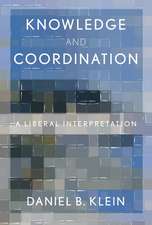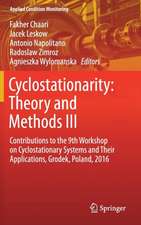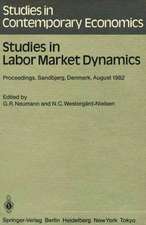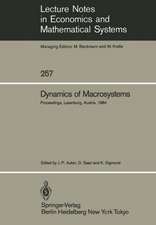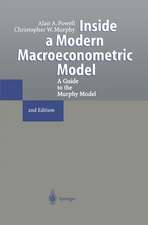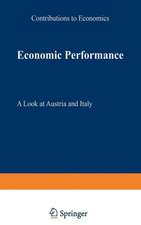New Tools of Economic Dynamics: Lecture Notes in Economics and Mathematical Systems, cartea 551
Editat de Jacek Leskow, Martin Puchet, Lionello F. Punzoen Limba Engleză Paperback – 13 iul 2005
Din seria Lecture Notes in Economics and Mathematical Systems
-
 Preț: 360.02 lei
Preț: 360.02 lei -
 Preț: 383.93 lei
Preț: 383.93 lei - 15%
 Preț: 693.39 lei
Preț: 693.39 lei -
 Preț: 384.09 lei
Preț: 384.09 lei -
 Preț: 380.07 lei
Preț: 380.07 lei -
 Preț: 446.26 lei
Preț: 446.26 lei -
 Preț: 497.37 lei
Preț: 497.37 lei -
 Preț: 380.84 lei
Preț: 380.84 lei -
 Preț: 384.86 lei
Preț: 384.86 lei -
 Preț: 378.34 lei
Preț: 378.34 lei -
 Preț: 399.67 lei
Preț: 399.67 lei - 20%
 Preț: 360.93 lei
Preț: 360.93 lei - 15%
 Preț: 643.16 lei
Preț: 643.16 lei -
 Preț: 379.09 lei
Preț: 379.09 lei -
 Preț: 404.76 lei
Preț: 404.76 lei -
 Preț: 385.62 lei
Preț: 385.62 lei - 15%
 Preț: 644.49 lei
Preț: 644.49 lei -
 Preț: 379.09 lei
Preț: 379.09 lei -
 Preț: 345.50 lei
Preț: 345.50 lei -
 Preț: 425.80 lei
Preț: 425.80 lei -
 Preț: 378.34 lei
Preț: 378.34 lei - 18%
 Preț: 775.65 lei
Preț: 775.65 lei -
 Preț: 392.60 lei
Preț: 392.60 lei -
 Preț: 401.61 lei
Preț: 401.61 lei - 15%
 Preț: 646.43 lei
Preț: 646.43 lei -
 Preț: 382.18 lei
Preț: 382.18 lei -
 Preț: 378.34 lei
Preț: 378.34 lei - 15%
 Preț: 637.59 lei
Preț: 637.59 lei - 15%
 Preț: 647.27 lei
Preț: 647.27 lei -
 Preț: 377.73 lei
Preț: 377.73 lei -
 Preț: 447.84 lei
Preț: 447.84 lei - 15%
 Preț: 644.49 lei
Preț: 644.49 lei -
 Preț: 386.00 lei
Preț: 386.00 lei - 15%
 Preț: 654.43 lei
Preț: 654.43 lei -
 Preț: 415.02 lei
Preț: 415.02 lei -
 Preț: 411.54 lei
Preț: 411.54 lei -
 Preț: 398.92 lei
Preț: 398.92 lei -
 Preț: 398.92 lei
Preț: 398.92 lei -
 Preț: 392.75 lei
Preț: 392.75 lei - 15%
 Preț: 635.47 lei
Preț: 635.47 lei - 20%
 Preț: 653.56 lei
Preț: 653.56 lei -
 Preț: 379.86 lei
Preț: 379.86 lei -
 Preț: 495.46 lei
Preț: 495.46 lei -
 Preț: 447.99 lei
Preț: 447.99 lei -
 Preț: 378.71 lei
Preț: 378.71 lei - 15%
 Preț: 637.13 lei
Preț: 637.13 lei -
 Preț: 385.84 lei
Preț: 385.84 lei -
 Preț: 378.54 lei
Preț: 378.54 lei - 15%
 Preț: 666.55 lei
Preț: 666.55 lei
Preț: 646.43 lei
Preț vechi: 760.50 lei
-15% Nou
Puncte Express: 970
Preț estimativ în valută:
123.73€ • 134.45$ • 104.00£
123.73€ • 134.45$ • 104.00£
Carte tipărită la comandă
Livrare economică 21 aprilie-05 mai
Preluare comenzi: 021 569.72.76
Specificații
ISBN-13: 9783540242826
ISBN-10: 3540242821
Pagini: 420
Ilustrații: XX, 396 p.
Dimensiuni: 152 x 229 x 22 mm
Greutate: 0.59 kg
Ediția:2005
Editura: Springer Berlin, Heidelberg
Colecția Springer
Seria Lecture Notes in Economics and Mathematical Systems
Locul publicării:Berlin, Heidelberg, Germany
ISBN-10: 3540242821
Pagini: 420
Ilustrații: XX, 396 p.
Dimensiuni: 152 x 229 x 22 mm
Greutate: 0.59 kg
Ediția:2005
Editura: Springer Berlin, Heidelberg
Colecția Springer
Seria Lecture Notes in Economics and Mathematical Systems
Locul publicării:Berlin, Heidelberg, Germany
Public țintă
ResearchCuprins
Large Interactive Economies.- Modeling a Large Number of Agents by Types: Models as Large Random Decomposable Structures.- An ABM-Evolutionary Approach: Bilateral Exchanges, Bargaining and Walrasian Equilibria.- A Genetic Algorithms Approach: Social Aggregation and Learning with Heterogeneous Agents.- Structure and Macroeconomic Performance: Heterogeneous Firms and Financial Fragility.- Firms Interaction and Technological Paradigms.- Can Catastrophe Theory Become a New Tool in Understanding Singular Economies?.- Pretopological Analysis on the Social Accounting Matrix for an Eighteen-Sector Economy: The Mexican Financial System.- Firm Creation as an Inductive Learning Process: A Neural Network Approach.- Agent-Based Environments: A Review.- Econometrics and Time Series.- Smooth Transition Models of Structural Change.- Fraction-of-Time Approach in Predicting Value-at-Risk.- Spectral Analysis for Economic Time Series.- Policy Analysis Using a Microsimulation Model of the Italian Households.- Validating a Dynamic Microsimulation Model of the Italian Households.- Recent Advances in Micromodeling: The Choice of Retiring.- Applied Econometrics Methods and Monetary Policy: Empirical Evidence from the Mexican Case.- Themes of Growth and Development.- Environmental Policy Options in the Multi-Regimes Framework.- An Empirical Analysis of Growth Volatility: A Markov Chain Approach.- New Measurement Tools of the External-Constrained Growth Model, with Applications for Latin America.- The Fractal Structure, Efficiency, and Structural Change: The Case of the Mexican Stock Market.- Processes of Evolutionary Self-Organization in High Inflation Experiences.- Semi-Infinite Programming: Properties and Applications to Economics.


